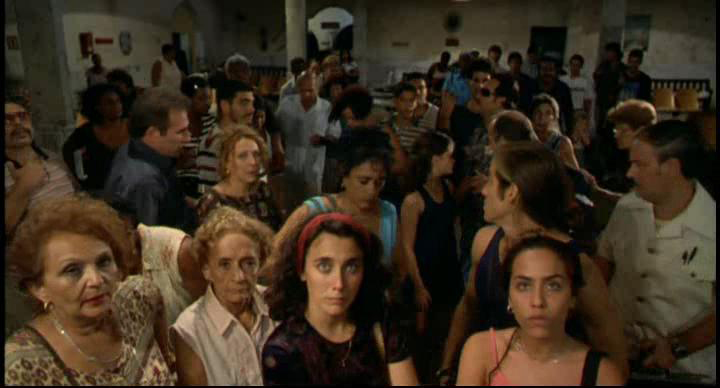Xavier Carbonell, SIGNIS Correspondent
There are terrifying spaces in the island that become, for any Cuban, a special center of asphyxia: the store or bodega, in which we receive food rationed by the well-known libreta de abastecimiento, a sort of supply notebook; the hospital, as free as repugnant; the police station, so similar to hell that you’d rather be a monk than a criminal; and, in general, every location where a titanic, perspiring crowd of neighbors waits for something.
In this catalog of fantastic places emerges the bus station or terminal, capable of generating powerful and violent queues that work, at the same time, as boxing ring and runners’ stadium. Each one of these circumstances, unfortunately, could be an ideal compendium of what the island stood during the Special Period.
The multiplicity of scarcities leads to dehumanization, frustration and —using the strong words of a Spanish storyteller— a sort of cancer spreading through the soul. Inside the cinema and the literature of the Nineties and our time, these spaces reached an exceptional symbolism.
Juan Carlos Tabío —who had already interpreted the Cuban decadence in Fresa y chocolate— provided another reading of the crisis in Lista de espera (Waiting List, 2000). For ten years the socialist bureaucrats intended to resurrect our dying economy, but they failed. That time was enough to allow the Great Disappointment to corrode the mental health and the hope of many Cubans, which threw themselves into the Caribbean Sea, trying to defeat death and storms. I’m talking about the so-called balseros, improvised rafters that hardly reached the North American shore.
Those who remained at the island, saw how everything turned into a surreal nightmare that —acidly and humorously— Lista de espera describes. A group of passengers waits for a bus, which in Cuba is called guagua, possessed by the anxiety of many days without transport. Everyone seems to be resigned to the mistreatment of the functionaries, the awful functioning of the system, the cynicism of those who handle the destinies of the terminal, and even to the overwhelming ugliness of the building, the heat and the uncertainty.
To expect the bus —or the country— to be fixed, is as naive as to wait for replacement parts sent by the former Soviet Union. There is no one to direct or organize: the queue must consolidate itself if it wants to survive.
However, the movie offers not only a total vision, but goes also to the individual being, who no longer feels part of the mass if it’s not to protest or to enter in an absolute state of historic depression. The New Man represented in David —from Fresa y chocolate— is dissolved in Emilio, the young architect that arrives to the terminal in order to depart to Santiago de Cuba. It is very curious that the same actor, Vladimir Cruz, interprets both characters.
The young and the old, the blind, many children, men and women, good people and fairground bandits, believers of every religion or more atheists than Lenin; Lista de espera studies the terminal as a laboratory or radiography of the Cuban fate after the death of Russian socialism.
The outcome is clear, there is no happiness outside the simple things: love, sex, friendship, game or food —that none can share, of course.
As the film goes by, the passengers assume that there is no scape but to fight against frustration, because nothing can be expected from bureaucrats and their false promises. They paint the walls of the bus station, the bus can be fixed and the world —once colored in post-soviet black and white— goes back to be warm and kind.
At the end, of course, the sun rises and each one discovers, with the sadness of the poor man, that everyone has dreamed the same dream, and that utopia only existed within the melancholy and the desire of another island, less undeserved and aggressive.
Neither the ghosts of fiction, nor the Cubans of flesh and bone could forget, however, what was the taste of paradise. With a lot of exhaustion within us, and a too dense accumulation of memories, each one followed different paths. Cuba was that bittersweet dream that, as every utopia, became a lost love.
***
The collection of articles “Cuba in Seven Films”, published by SIGNIS originally in Spanish, in 2020, received the Paco Rabal Award of Cultural Journalism, Madrid (Spain) in the category of “Young Promise”.


